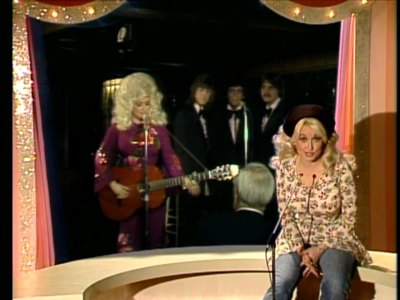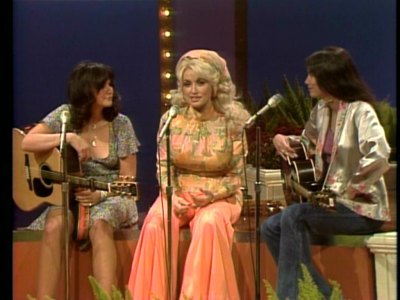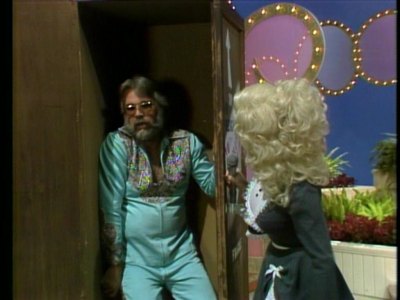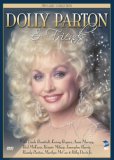| Reviews & Columns |
|
Reviews DVD TV on DVD Blu-ray 4K UHD International DVDs In Theaters Reviews by Studio Video Games Features Collector Series DVDs Easter Egg Database Interviews DVD Talk Radio Feature Articles Columns Anime Talk DVD Savant Horror DVDs The M.O.D. Squad Art House HD Talk Silent DVD
|
DVD Talk Forum |
|
|
| Resources |
|
DVD Price Search Customer Service #'s RCE Info Links |
|
Columns
|
|
|
Dolly Parton and Friends
MPI's two disc set, Dolly Parton and Friends is an interesting collection of episodes from Parton's 1976 solo TV series, Dolly. Successful when it sticks to just Parton singing songs that work for her, the 25 minute Dolly episodes run into trouble when suspect guest stars show up who have little or no rapport with the host, and when Dolly has to sing songs ill-suited to her talents. Still, there's much to enjoy in this six episode collection, and it's a must for Parton fans.

I'm no expert on country music, but I've always enjoyed Dolly Parton's showmanship. Her phenomenal success (she's the most honored female country singer ever, with over 100 million records sold) is due precisely because she's been able to cross over and grab the attention of people like me, who aren't regular fans and consumers of country music. When I was a kid, they used to show The Porter Wagoner Show on Saturday afternoon TV, with Dolly usually showing up to do a duet with country star Wagoner. At this point, her penchant for mile-high wigs was firmly entrenched (a smart marketing hook, if you ask me, that got her remembered with the public), and her easy-going, country charm was evident. But for me at least, these appearances were the last time I was really aware of her, until she started to cross over into the pop music and motion picture fields in the mid-to-late 1970s. I don't remember catching any of the Dolly series, highlighted here on the Dolly Parton and Friends two disc set, so I was looking forward to seeing this part of her career.
Each episode of the Dolly series opens exactly the same way: a close-up of a huge, hanging, pink and blue prop butterfly, while Dolly's Love is Like a Butterfly plays in the background. The structure of the episodes also rarely varies. Dolly descends onto her small, sparse stage (decorated like a seating area in a mall, with various potted planters) via a large, red velvet swing. Why she does this, I have no idea (although she does say in one episode that she always wanted to do that when she was a kid), but it's an odd visual, and indicative of the unsteady nature of the show's production. Then, Dolly opens with her own song, to be interrupted briefly by her co-star, who, after bantering with Dolly, usually joins her in finishing the song. Then, various numbers are sung by Dolly solo (sometimes in the studio, sometimes on location in Nashville, where the show was filmed), with her guest stars also getting a chance to solo, finishing up with a duet between the two. Dolly signs off the show by signing her signature theme, I Will Always Love You.
The first episode of Dolly is sensational. Her guest stars are friends Emmylou Harris and Linda Ronstadt, and their rapport together is natural and easy-going. The sole purpose of the episode is to show them singing, and they don't disappoint. Among the songs sung, Harris does a haunting version of Parton's My Blue Ridge Mountain Boy, Ronstadt sings I Can't Help it if I'm Still in Love With You, and the three together sing a spirited version of Applejack. A bypass to a location shoot, with Dolly performing in a small club, is a real eye-opener to see the kinds of venues she used to perform in. She also does an amazing trick of singing a song like a 45 record at 78 speed, with it sounding weirdly mechanical and accurate. It's a terrific show, and an important historical moment, uniting the future Trio grouping of Parton, Harris and Ronstadt, for the first time in public. It's clear by the quiet watchfulness of the women that they respect each other's talents, making for a focused, entertaining episode.

Unfortunately, the memory of this great start is largely erased by the following episode, featuring the inexplicably popular (at least for his singing) Rod McKuen. Dolly appears uncomfortable interacting with Rod, who, despite record sales in the tens of millions in the 1960s, clearly can't sing a lick. Croaking out China Grove with Parton, McKuen makes Lee Marvin in Paint Your Wagon sound like Caruso in comparison. Nothing that McKuen attempts in this episode works, including inserting poetry over Parton's rendition of the most hated song of the 1970s, Feelings. Most embarrassing of all for Dolly, she's forced to sing My Funny Valentine to a hound dog, while he slobbers milk out of a champagne glass. It's truly a bizarre moment, and it's indicative of the schizophrenic nature of the series. An amazing episode like the first one is followed by a debacle like the McKuen one. It's no wonder that Dolly openly disliked this series, and bailed after only one season.
Parton had little artistic control over Dolly, and almost no say over who the guest stars would be. She's been quoted as saying she enjoyed having those that appeared on her show (a pro like Dolly would never badmouth somebody in public), but that if she had had any say in the matter, she would have picked different kinds of guests, focusing more on genuine country stars. Certainly, there are stars featured in the Dolly Parton and Friends discs that Dolly doesn't click with; her discomfort is clearly visible. But she soldiers on with her good cheer and down home charm, and makes the best of a bad situation by continuing to sing -- qualities that have always stood her in good stead with her audiences. Occasionally, a good guest star (Kenny Rogers) is forced along with Dolly to do some really dumb things (they lock Kenny in a packing crate - I'm not kidding - and make him bang on a pipe while Dolly sings Knock Three Times), but other times, when the producers leave the shtick behind, we get a chance to see some great performances (Ronnie Milsap singing Pure Love; Marilyn McCoo and Billy Davis, Jr. smoothly grooving on You Can't Change My Heart). The episodes in the Dolly Parton and Friends disc set may vary in quality, but taken as a whole, it's a worthwhile effort.
Dolly Parton is a supremely talented songwriter (she has written and published over 600 songs) and singer, but that alone wouldn't have accounted for her enormous fame. Parton also has an amazing ability to seemingly connect with each individual audience member, making them feel as if she's singing directly to them. It's old-fashioned "star quality," and you can't bottle it. You're either born with it or you're not, and Parton has it. The Dolly Parton and Friends two disc set, though erratic at times, offers Parton fans a necessary look at the artist just before she crossed over into mainstream popularity.

The DVD:
The Video:
I wasn't expecting a lot in the way of image quality when I saw that the Dolly Parton and Friends material was taken from the 1976 show, but I was amazed at how flawless the video actually was. Originally produced on video, Dolly looks like it was shot just yesterday; it's hard to believe it was filmed thirty years ago.
The Audio:
Although the Dolby Digital English 2.0 Mono track accurately reflects the original audio presentation of the old Dolly show, I would have really liked to see at least a stereo mix offered. That's a let-down here.
The Extras:
There are two extras offered on the Dolly Parton and Friends set. They consist of two short numbers performed by Dolly on The Porter Wagoner Show. The first disc has Dolly singing Coming For to Carry Me Home, from 1971, and disc two has Dolly singing Foggy Mountain Top, from 1969. When is someone going to release some of those fun Porter Wagoner shows?
Final Thoughts:
The Dolly Parton and Friends two disc set, culled from Dolly Parton's 1976 syndicated variety show Dolly, is an uneven collection of six of those episodes. But it's a valuable look at Parton right before she crossed over into the superstar status, and includes some really marvelous performances by not only Parton, but several of her celebrity guests. I'm recommending Dolly Parton and Friends.
Paul Mavis is an internationally published film and television historian, a member of the Online Film Critics Society, and the author of The Espionage Filmography.


|
| Popular Reviews |
| Sponsored Links |
|
|
| Sponsored Links |
|
|
| Release List | Reviews | Shop | Newsletter | Forum | DVD Giveaways | Blu-Ray | Advertise |
|
Copyright 2024 DVDTalk.com All Rights Reserved. Legal Info, Privacy Policy, Terms of Use,
Manage Preferences,
Your Privacy Choices | |||||||














